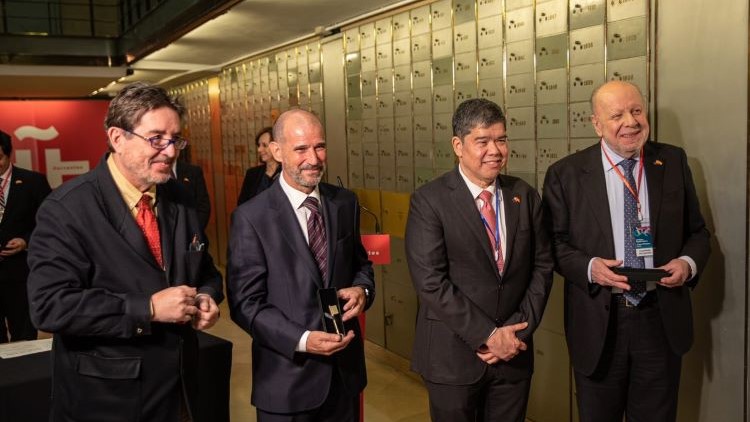The Diplomat
The Caja de las Letras (Literature Safebox) of the Instituto Cervantes received yesterday, as a legacy in memoriam, the first novel by Filipino writer José Rizal, Noli Me Tangere (published in Europe in 1887), and its sequel, El Filibusterismo (1891), two works that were crucial in the popular movement that led to the independence of the Philippines and whose main hero was Rizal himself.
The event was attended by the director of the Instituto Cervantes, Luis García Montero; the Secretary of State of the Philippine Ministry of Foreign Affairs, Eduardo José Atienza de Vega, and the ambassadors of both countries: Miguel Utray, representative of Spain in Manila, and Philippe Lhuillier, representative of the Philippines in Madrid. After this ceremony, Rizal’s legacy will be kept in box number 1690 of the old vault of the Instituto Cervantes headquarters and will become part of the institution’s Patrimonial Library.

José Rizal (1861-1896), physician, writer and political activist, was shot after being convicted of treason for unlawful association with other Filipino revolutionaries. From Noli Me Tangere. Novela Tagala, his best known title, two editions were deposited: one in 1958 published for the first centenary of his birth, and another in 1992, by Ediciones de Cultura Hispánica. Of his sequel, El Filibusterismo, two editions from 1961 and 1997 were also kept. Two other volumes were also kept yesterday: the book Rizal. Dos diarios de juventud (1882-1884), by Ortiz Armengol y Molina (1960), and volume IX of the Facsimiles of the writings of Jose Rizal, published in 1962 in Manila on the occasion of his centenary.
According to Garcia Montero, receiving these books and manuscripts “is an honor and a joy” because they evidence the importance of “a great writer, a representative of Philippine history and an author who helps us think about the past and commit ourselves to our future” and represents “the strength of reason and dignity”. He also highlighted his relevance as a writer in the Spanish language and his importance as a historical figure at that time, until he ended up being the victim of an “unjust death”.

The Spanish ambassador, Miguel Utray, who years ago was director of International Relations at Cervantes, denounced the “unjust execution” of the novelist, polyglot poet and painter. For his part, the Philippine ambassador said that the two novels deposited are “masterpieces written by our national hero, two literary treasures” that ignited “the fire of freedom, happiness and prosperity in the hearts of all Filipinos”.
The tribute to Rizal was part of the opening of the 9th Spain-Philippines Tribune, organised by Casa Asia with the support of the Institute and which will be closed today by the Secretary of State for Foreign Affairs, Ángeles Moreno. Two debates were held in yesterday’s sessions, which analysed the role of Spain and the Philippines in the Indo-Pacific region and the role of gas and renewable energies in the energy transition of the Philippines.
Today’s session, with a markedly cultural character, will open with the Tribuna del Hispanismo Filipino, in which the Hispanists Daisy López, Marlon James Sales and Luisa P. Young, moderated by Javier Galván, Director of the Cervantes Institute in Manila, will examine the situation of Hispanic studies in the archipelago. Finally, the fifth debate will be devoted to Philippine studies in Spain, with Maria Dolores Elizalde, researcher at the CSIC; Irene Villaescusa, professor at the University of Amsterdam; Rocío Ortuño, professor at the University of Antwerp; and Rafael Rodríguez Ponga, rector of the Abat Oliba-CEU University.







